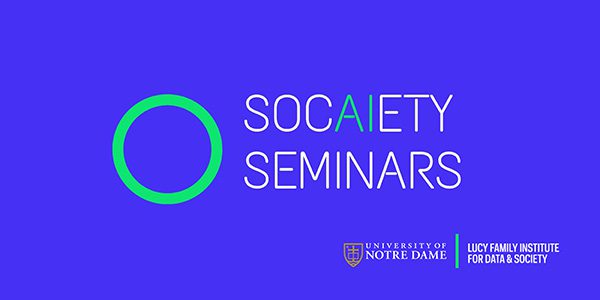Finding Meaning and Mission in a Restless World – The Heart’s Desire & Listening for Vocation
Subscribe to the ThinkND podcast on Apple, Spotify, or Google.
Featured Speakers:
- Rev. Daniel G. Groody, C.S.C., Vice President and Associate Provost; Associate Professor of Theology and Global Affairs, University of Notre Dame
- Parker Palmer, Writer, Speaker, Activist, and Founder, Senior Partner Emeritus, Center For Courage and Renewal
The final live session of the Heart’s Desire and Social Change podcast welcomed Parker Palmer, the founder and Senior Partner Emeritus of the Center for Courage and Renewal, as well as an acclaimed speaker, author and activist. The event was moderated by Rev. Daniel G. Groody, C.S.C., the Vice President, Associate Provost, and an Associate Professor of Theology and Global Affairs at the University of Notre Dame. This podcast focused on the activist and literary work that Palmer has dedicated his life to, as well as the discussion of the wisdom he has gained in his 82 years of life. Palmer addressed topics such as how to follow the true calling of one’s heart, the struggles often encountered on the journey to the heart’s desire and continued discernment through retirement.
Fr. Groody began the session by introducing a book written by Palmer entitled Let Your Life Speak. This book has been highly influential in the lives of many throughout their discernment processes, and Palmer addressed the meaning of the title as well as the journey of his life that prompted the authorship of the book. Fr. Groody’s first question highlighted the importance of letting one’s life speak but also asked why this is often so difficult a task in practice. Palmer answered by identifying the core truths that are revealed by so intimate a task. Many who engage in this practice are fearful of what they find hidden in their inner selves, truths that require a shift away from known routines and the expectations that others have of us. We struggle between the conflicted voices we hear within ourselves of both fear and true calling. Palmer grew up in the Chicago suburbs and was the first in his family to attend college. He earned his Ph.D. from the University of California, Berkeley, but felt a moral imperative to pursue social action work rather than take advantage of the multiple academic opportunities he had been offered. He strove to use his educational knowledge to address social issues in a time fraught with war and racism rather than pursue the careers of his peers. Though this caused challenges for his family and himself, he chose to follow the callings of his heart rather than ignore them. There are no paths in life that are cost free, so Palmer chose to take on the difficult task of working for social justice. He opened up to participants about his struggles with clinical depression and the realization that he couldn’t solve these issues alone, but rather was called to do what was in his power to do.
Palmer then moved to discuss the periods of discernment that he has experienced throughout his life. One important spiritual practice for him stems from his religious affiliation with the Quaker community. This community does not have clergy, but rather formulates a communal response to the usual tasks of the clergy. The practice is a clearness committee, a group of about 6 individuals tasked with assisting with a complex decision by listening deeply and asking deep questions that force the individual discerning to truly uncover their deepest desires. Palmer emphasized the vulnerability required to take part in this process of self-discovery whether within a clearness committee or alone. One must take a break from the activities of the world to truly ask themselves where their true identity lies and who they are without their work and other responsibilities. This was especially important for him in retirement when he struggled to take time to rest. Palmer also discussed the metaphor of music that has guided his understanding of life recently. He views everything as being held together by music and contributing to the song of life. He hopes to continue the music of his life beyond death by leaving a collective legacy rather than a personal one.
In the last portion of the event, Fr. Groody posed questions to Palmer from participants. The first question related to finding one’s calling later in life. Palmer emphasized that less pressure should be put on finding a specific, concrete calling that you can dedicate your life to. Instead, find things that give you satisfaction at each stage of your life and partner with younger individuals later in life to continue searching for new passions. Vocation is not something that is concrete, but rather an outward manifestation of one’s gifts. The second question related to the pandemic and what it has taught us as a society. Palmer recognized the immense challenge that this experience has caused many, but also identified the opportunity found in the decrease in social engagements. This offered many the time to conduct inner meditation and gain insight into their identities and life journeys. The pandemic offered many the opportunity to explore their inner life which can serve to ground us through any crisis. Fr. Groody concluded the event by playing a song written by Palmer, “The Music Will Play On”, and posing a final question to the audience: How would you like the music of your own life to play on?
- We have multiple voices within ourselves at all times, voices of the soul, of fear, of greed, those telling us to play it safe and take risks. Sorting through and making sense of these voices is difficult at any age. (7:21)
- There are no paths in life that are cost free. Though following the proddings of the soul causes pain and challenge in the moment, not heeding moral imperatives costs something of the soul in the future. (12:21)
- Moral imperatives may not provide happiness and giddy feelings every day of your life, but following your true calling provides a deeper sense of joy. (17:56)
- Take a break from the steady stream of activity to discover your true identity and value. (31:10)
- Be grateful for the simple gifts of life and meditate on them. Make space in your life for gratitude and joy. (36:12)
- Don’t put so much pressure on yourself to find your specific, concrete calling. Vocations play out in a unique way for each individual, especially in the present age of shifts within the workplace. (48:02)
- “It’s hard to let our lives speak because the more deeply we listen to our souls, hearts, imperatives, identity and integrity, the more challenging our lives become, the more we have to step away from normalized patterns of life and expectations that other people hold of us, which is in and of itself challenging. (Parker Palmer, 6:32)
- “A life lived by other people’s scripts just doesn’t work.” (Parker Palmer, 11:48)
- “I’m not expected to do the whole job, I’m expected to do what’s within my reach and capacity to. I’m expected to be as faithful as I know how to each step as I walk into that vocation and sense of calling.” (Parker Palmer, 16:51)
- “I’ve slowly learned over the years to unburden myself of futile expectations and the lack of self-forgiveness that actually takes you out of the action rather than encouraging you to stay in at deeper levels.” (Parker Palmer, 18:37)
- “Who am I when I’m not doing what I’ve done all my life? Who am I when I’m simply being human? What does it mean to be human?” (Parker Palmer, 33:24)
- “The inner life has always been for me a grounding point in the midst of whatever the crisis is, and there always is one, either in the world around me or within myself, and often both simultaneously.” (Parker Palmer, 55:40)
Related Content
Reunion 2024
Alumni Education Programming Click each program title to learn more. ND Perspectives: Election 2024 and the Future of Democracy in the U.S. The 2024 presidential election looms...
Read ArticleA Brave New World of AI Governance
Explore the connection between data, geopolitics and governance, regulation, self-regulation while discovering examples of good and bad practices in various sectors, such as...
View EventAlgorethics: potentiality and challenges in the age of AI
Explore the possibilities and challenges in ethical governance of AI through algorethics. Algorethics is a term that has been developed since 2018 to denote the need for a study...
View Event

